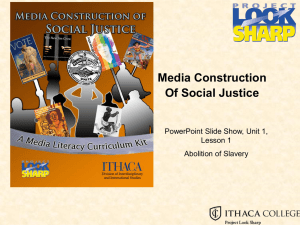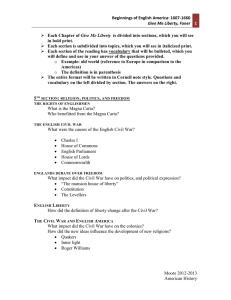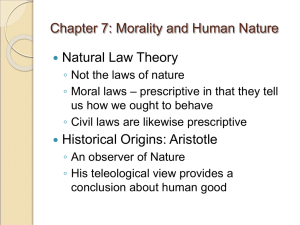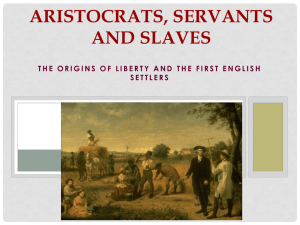The Enlightenment Readings Package Part II
advertisement
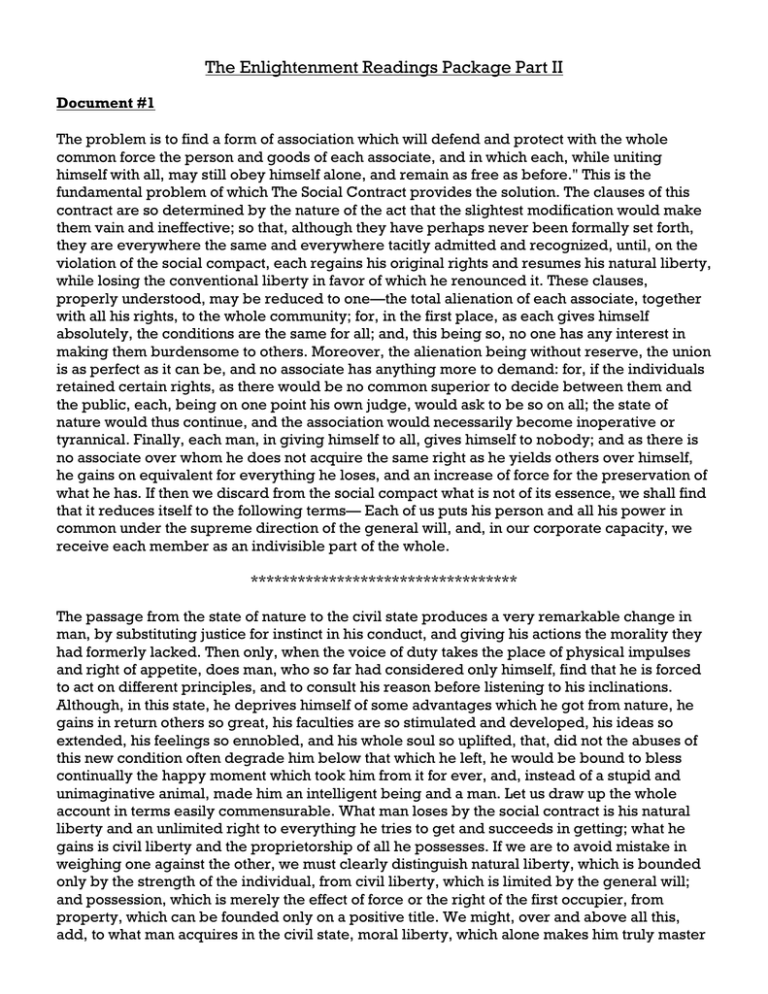
The Enlightenment Readings Package Part II Document #1 The problem is to find a form of association which will defend and protect with the whole common force the person and goods of each associate, and in which each, while uniting himself with all, may still obey himself alone, and remain as free as before." This is the fundamental problem of which The Social Contract provides the solution. The clauses of this contract are so determined by the nature of the act that the slightest modification would make them vain and ineffective; so that, although they have perhaps never been formally set forth, they are everywhere the same and everywhere tacitly admitted and recognized, until, on the violation of the social compact, each regains his original rights and resumes his natural liberty, while losing the conventional liberty in favor of which he renounced it. These clauses, properly understood, may be reduced to one—the total alienation of each associate, together with all his rights, to the whole community; for, in the first place, as each gives himself absolutely, the conditions are the same for all; and, this being so, no one has any interest in making them burdensome to others. Moreover, the alienation being without reserve, the union is as perfect as it can be, and no associate has anything more to demand: for, if the individuals retained certain rights, as there would be no common superior to decide between them and the public, each, being on one point his own judge, would ask to be so on all; the state of nature would thus continue, and the association would necessarily become inoperative or tyrannical. Finally, each man, in giving himself to all, gives himself to nobody; and as there is no associate over whom he does not acquire the same right as he yields others over himself, he gains on equivalent for everything he loses, and an increase of force for the preservation of what he has. If then we discard from the social compact what is not of its essence, we shall find that it reduces itself to the following terms— Each of us puts his person and all his power in common under the supreme direction of the general will, and, in our corporate capacity, we receive each member as an indivisible part of the whole. ********************************** The passage from the state of nature to the civil state produces a very remarkable change in man, by substituting justice for instinct in his conduct, and giving his actions the morality they had formerly lacked. Then only, when the voice of duty takes the place of physical impulses and right of appetite, does man, who so far had considered only himself, find that he is forced to act on different principles, and to consult his reason before listening to his inclinations. Although, in this state, he deprives himself of some advantages which he got from nature, he gains in return others so great, his faculties are so stimulated and developed, his ideas so extended, his feelings so ennobled, and his whole soul so uplifted, that, did not the abuses of this new condition often degrade him below that which he left, he would be bound to bless continually the happy moment which took him from it for ever, and, instead of a stupid and unimaginative animal, made him an intelligent being and a man. Let us draw up the whole account in terms easily commensurable. What man loses by the social contract is his natural liberty and an unlimited right to everything he tries to get and succeeds in getting; what he gains is civil liberty and the proprietorship of all he possesses. If we are to avoid mistake in weighing one against the other, we must clearly distinguish natural liberty, which is bounded only by the strength of the individual, from civil liberty, which is limited by the general will; and possession, which is merely the effect of force or the right of the first occupier, from property, which can be founded only on a positive title. We might, over and above all this, add, to what man acquires in the civil state, moral liberty, which alone makes him truly master of himself; for the mere impulse of appetite is slavery, while obedience to a law which we prescribe to ourselves is liberty. But I have already said too much on this head, and the philosophical meaning of the word liberty does not now concern us. SOURCE: Jean Jacques Rousseau, The Social Contract, 1762. Document #2 When I thus get rid of children's lessons, I got rid of the chief cause of their sorrows, namely their books. Reading is the curse of childhood, yet it is almost the only occupation you can find for children. Emile, at twelve years old, will hardly know what a book is. " But," you say, " he must at least, know how to read." When reading is of use to him, I admit he must learn to read, but till then he will only find it a nuisance. If children are not to be required to do anything as a matter of obedience, it follows that they will only learn what they perceive to be of real and present value, either for use or enjoyment; what other motive could they have for learning? The art of speaking to our absent friends, of hearing their words; the art of letting them know at first hand our feelings, our desires, and our longings, is an art whose usefulness can be made plain at any age. How is it that this art, so useful and pleasant in itself, has become a terror to children? Because the child is compelled to acquire it against his will, and to use it for purposes beyond his comprehension. A child has no great wish to perfect himself in the use of an instrument of torture, but make it a means to his pleasure, and soon you win not be able to keep him from it. People make a great fuss about discovering the beat way to teach children to read. They invent “bureaux” and cards, they turn the nursery into a printer's shop. Locke would have them taught to read by means of dice. What a fine idea! And the pity of it! There is a better way than any of those, and one which is generally overlooked--it consists in the desire to learn. Arouse this desire in your scholar and have done with your “bureaux” and your dice --any method will serve. Present interest, that is the motive power, the only motive power that takes us far and safely. Sometimes Emile receives notes of invitation from his father or mother, his relations or friends; he is invited to a dinner, a walk, a boating expedition, to see some public entertainment. These notes are short, clear, plain, and well written. Some one must read them to him, and he cannot always find anybody when wanted; no more consideration is shown to him than he himself showed to you yesterday. Time passes, the chance is lost. The note is read to him at last, but it is too late. Oh! if only he had known how to read! He receives other notes, so short, so interesting, he would like to try to read them. Sometimes he gets help, sometimes none. He does his best, and at last he makes out half the note; it is something about going tomorrow to drink cream-- Where? With whom? He cannot tell--how hard he tries to make out the rest! I do not think Emile will need a “bureau.” Shall I proceed to the teaching of writing? No, I am ashamed to toy with these trifles in a treatise on education. I will just add a few words which contain a principle of great importance. It is this: what we are in no hurry to get is usually obtained with speed and certainty. I am pretty sure Emile will learn to read and write before he is ten, just because I care very little whether he can do so before he is fifteen; but I would rather he never learnt to read at all, than that this art should be acquired at the price of all that makes reading useful. What is the use of reading to him if he always hates it?.... Give his body constant exercise, make it strong and healthy, in order to make him good and wise; let him work, let him do things, let him run and shout, let him be always on the go; make a man of him in strength, and he will soon be a man in reason. Of course by this method you will make him stupid if you are always giving him directions, always saying come here, go there, stop, do this, don’t do that. If your head always guides his hands, his own mind will become useless…. As for my pupil, or rather Nature’s pupil, he has been trained from the outset to be as self-reliant as possible, he had not formed the habit of constantly seeking help from others, still less of displaying his stores of learning. On the other hand, he exercises discrimination and forethought, he reasons about everything that concerns himself. He does not chatter, he acts. Not a word does he know of what is going on in the world at large, but he knows very thoroughly what affects himself. As he is always stirring he is compelled to notice many things, to recognize many effects; he soon acquires a good deal of experience. Nature, not man, is his schoolmaster, and he learns all the quicker because he is not aware that he has any lesson to learn. So mind and body work together. He is always carrying out his own ideas, not those of other people, and thus he unites thought and action; as he grows in health and strength he grows in wisdom and discernment. SOURCE: Jean Jacques Rousseau, Émile, 1762. Document #3 The source of man’s unhappiness is his ignorance of Nature. The pertinacity with which he clings to blind opinions imbibed in his infancy, which interweave themselves with his existence, the consequent prejudice that warps his mind, that prevents its expansion, that renders him the slave of fiction, appears to doom him to continual error. He resembles a child destitute of experience, full of idle notions: a dangerous leaven mixes itself with all his knowledge: it is of necessity obscure, it is vacillating and false:—He takes the tone of his ideas on the authority of others, who are themselves in error, or else have an interest in deceiving him. To remove this Cimmerian darkness, these barriers to the improvement of his condition; to disentangle him from the clouds of error that envelop him, that obscure the path he ought to tread; to guide him out of this Cretan labyrinth, requires the clue of Ariadne, with all the love she could bestow on Theseus. It exacts more than common exertion; it needs a most determined, a most undaunted courage—it is never effected but by a persevering resolution to act, to think for himself; to examine with rigor and impartiality the opinions he has adopted. . . . The most important of our duties, then, is to seek means by which we may destroy delusions that can never do more than mislead us. The remedies for these evils must be sought for in Nature herself; it is only in the abundance of her resources, that we can rationally expect to find antidotes to the mischiefs brought upon us by an ill-directed, by an overpowering enthusiasm. It is time these remedies were sought; it is time to look the evil boldly in the face, to examine its foundations, to scrutinize its super-structure: reason, with its faithful guide experience, must attack in their entrenchments those prejudices to which the human race has but too long been the victim. For this purpose reason must be restored to its proper rank,—it must be rescued from the evil company with which it is associated.... Truth speaks not to these perverse beings:—her voice can only be heard by generous minds accustomed to reflection, whose sensibilities make them lament the numberless calamities showered on the earth by political and religious tyranny—whose enlightened minds contemplate with horror the immensity, the ponderosity of that series of misfortunes with which error has in all ages overwhelmed mankind. The civilized man, is he whom experience and social life have enabled to draw from nature the means of his own happiness; because he has learned to oppose resistance to those impulses he receives from exterior beings, when experience has taught him they would be injurious to his welfare. The enlightened man, is man in his maturity, in his perfection; who is capable of pursuing his own happiness; because he has learned to examine, to think for himself, and not to take that for truth upon the authority of others, which experience has taught him examination will frequently prove erroneous. . . . It necessarily results, that man in his researches ought always to fall back on experience, and natural philosophy: These are what he should consult in his religion—in his morals—in his legislation—in his political government—in the arts—in the sciences—in his pleasures—in his misfortunes. Experience teaches that Nature acts by simple, uniform, and invariable laws. It is by his senses man is bound to this universal Nature; it is by his senses he must penetrate her secrets; it is from his senses h$ must draw experience of her laws. Whenever, therefore, he either fails to acquire experience or quits its path, he stumbles into an abyss, his imagination leads him astray. SOURCE: Baron d’Holbach, System of Nature, 1770. Document #4 "Dedicatory Epistle to the Negro Slaves" My Friends, Although I am not the same color as you, I have always regarded you as my brothers. Nature formed you with the same spirit, the same reason, the same virtues as whites. . . . Your tyrants will reproach me with uttering only commonplaces and having nothing but chimerical [unrealistic) ideas: indeed, nothing is more common than the maxims of humanity and justice; nothing is more chimerical than to propose to men that they base their conduct on them. Reducing a man to slavery, buying him, selling him, keeping him in servitude: these are truly crimes, and crimes worse than theft. In effect, they take from the slave, not only all forms of property but also the ability to acquire it, the control over his time, his strength, of everything that nature has given him to maintain his life and satisfy his needs. To this wrong they add that of taking from the slave the right to dispose of his own person. . . . It follows from our principles that the inflexible justice to which kings and nations are subject like their citizens requires the destruction of slavery. We have shown that this destruction will harm neither commerce nor the wealth of a nation because it would not result in any decrease in cultivation. We have shown that the master had no right over his slave; that the act of keeping him in Servitude is not the enjoyment of a property right but a crime; that in freeing the slave the law does not attack property but rather ceases to tolerate an action which it should have punished with the death penalty. The sovereign therefore owes no compensation to the master of slaves just as he owes none to a thief whom a court judgment has deprived of the possession of a stolen good. The public tolerance of a crime may make punishment impossible but it cannot grant a real right to the profit from the crime. If writers protest against the slavery of Negroes, it is the philosophes, their opponents say, thinking they have won their case. . . . If some people have been saved by innoculation from the dangers of smallpox, it's by the advice of the philosophes. . . . If the custom of breaking the bones of the accused between boards to make them tell the truth has been recently suppressed, it's because the philosophes inveighed against the practice; and it is in spite of the philosophes that France has been lucky enough to save a remnant of the old laws and conserve the precious practice of applying torture to condemned criminals….Who is it who dares to complain in France about the cruelty with which the French Protestants have been deprived of the rights of man and citizen, about the harshness and injustice of the laws against smuggling and on hunting? Who has the culpable boldness to pretend that it would be useful to the people and in accord with justice to insure liberty of commerce and industry?....We can see clearly that it was surely the philosophe. SOURCE: Antoine Nicholas de Condorcet, The Evils of Slavery, 1794.

